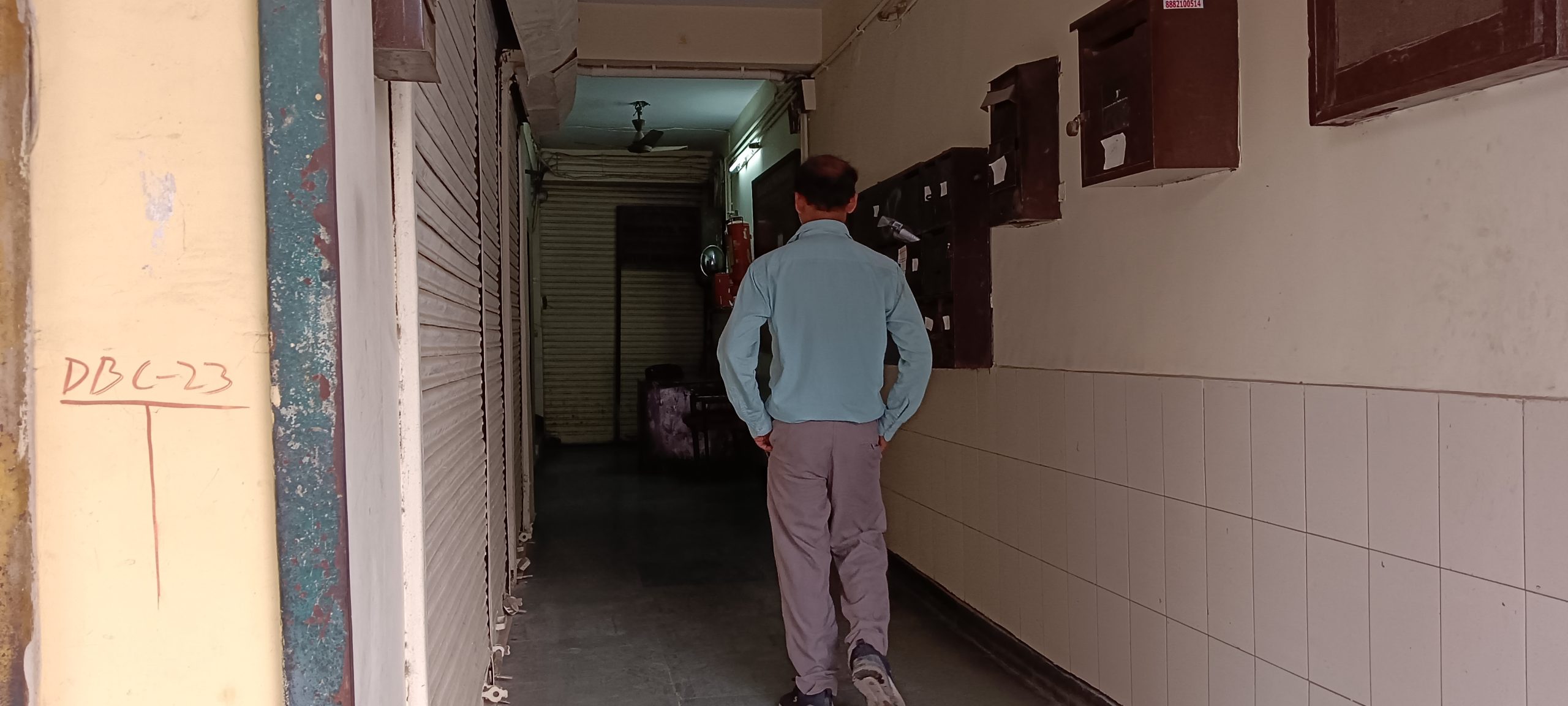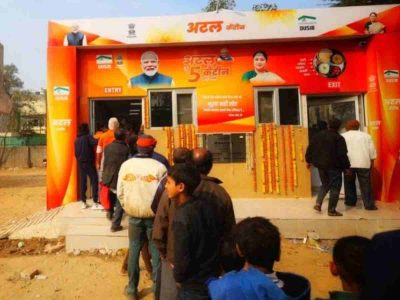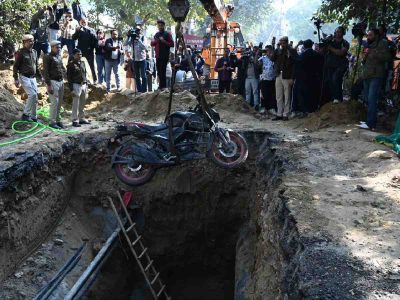Awadesh Singh, a cardiologist by profession, formed his own political party in 2016 in the hopes of implementing his ideals of a democracy made for the people and by the people. He registered his fairly small-sized political party, the Shane Hind Forum (SHF) (pronounced as Shaan-e-Hind Forum), and became its national president.
The party had sought to enter the fray with the novel concept of overhauling Indian democracy through the two-past-the-post system rather than the conventional first-past-the-post voting process.
“Through the process that we wish to introduce, both the opposition and the party first past the proverbial finish line will get an equal chance to govern together. The head of the state can be voted upon by both the parties together. This will lead to the formation of a nation that is wholly democratic and without any bias,” said the 69-year-old to Patriot.
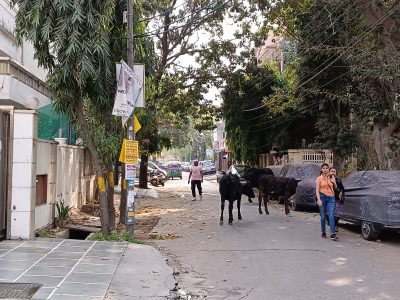
The formation of a party along the lines of such a romantic and novel concept has led to them receiving Rs 10,230 as donation according to their Audit Report for 2023 submitted to the Election Commission of India (ECI). However, according to the same report, they had used nothing out of the said fund to campaign for the elections during the said tenure, saving it to use for the Lok Sabha elections in 2024.
“We do not get a lot of funds. Whatever we have, we need to use it economically. I am a regular person and I do not have as much resources for a star campaigner, or even for regular campaigns in general,” he said.
Singh added that the party with approximately 1,000 volunteers is slated to contest the upcoming elections from Delhi as well as Uttar Pradesh’s Gorakhpur.
“Earlier in 2021, we had contested the Uttar Pradesh Legislative Assembly elections from my hometown, Gorakhpur. We did not win but I believe that we cannot bring about a change in a fortnight. We need some time on ground and need to campaign more to let the voters know about where we stand,” he said.
“Our party wishes to see the country free from the divisive politics of caste, creed, religion and class that many of the national parties bring to the forefront which splits the votes according to the said factors. We dream of an absolute democracy,” he said. Numerous such political parties, with as little as Rs 10,000 in their bank accounts, have decided to contest the upcoming general elections, running high on their ideals.
The Bahujan Shoshit Samaj Sangharsh Samta Party (B4SP) functions out of an apartment, which also doubles as Manju Jatav’s house, the national president of the party. Placed inside the Delhi Development Authority’s (DDA) Creative Heights apartment complex, the national president figures out the functions of her party from within.
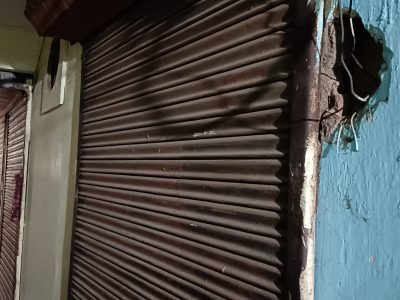
Having contested the recently concluded Rajasthan assembly elections in 2023, the B4SP is gearing itself up for the upcoming Lok Sabha elections. However, one factor remains a bother — a lack of funds. According to their 2022-23 audit report, which was submitted in December 2023, the party neither received any contribution nor did it use any funds according to its expenditure report.
“We have the candidates to field for the elections which cannot be revealed as of yet, but not having sufficient funds has been a problem since the date of party’s inception. Since we have only begun, it is but a matter of time that we gain ground for our community,” she said.
The Vice President of the party, Khilkhilakar Jatav, said, “It is only fair to try once. Not having enough money, or not winning seats, is not enough to deter us. If we do not try to win, then there is no point.”
On the other hand, parties like the Swatantra Rashtravadi Party (SRP) lay desolate inside a two-storey rundown commercial building. Sheltered atop a panwallah’s shop, the party head office at Daryaganj lacks nameplate or hoarding. Cobwebs have formed around the shutters, which served as the entry to the ‘office’.

Still finding their footing after the alleged murder of their national president, the party had received donations of Rs 1,500 according to their Audit Report, with expenditure of the same amount.
“They have been closed for around two months after the murder of their president. Sometimes they open the office but it is not often,” said the owner of a shop adjacent to the party office.
One of the workers at the shop added that an aged person arrives sometimes to check upon the office. The party’s numbers were dysfunctional when the reporter tried reaching out.
Similarly, Azadpur-based Adarsh Political Party’s office is attended by one person, who looks after the day-to-day affairs of the party. However, with a contribution of only Rs 10,800 for 2022-23, and an expenditure of Rs 9,639, the idealistic party has little to stay afloat, according to other shopkeepers.
However, parties like Swaraj Janata Party remain hopeful of bringing about a difference. Brijesh Shukla, the party president, recalled the time when he was hopeful of his party becoming the talk of the town.
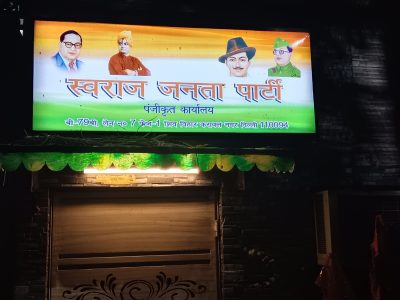
“We never expected to gain ground in a short span of time. I knew that it would take more groundwork and labour. Thus, to become a face in the political scenario in the country, we sent a letter to Prime Minister Narendra Modi and Home Minister Amit Shah in 2019, stating that we supported the National Democratic Alliance’s (NDA) claim to power,” he said.
He further added that not having enough funds has posed to be a massive hindrance, considering that their audit report mentioned a receipt of Rs 9,500, and an expenditure of Rs 9,390.
“I don’t think we will be breaking even any time soon, especially when other political parties take to doing quid pro quo for other businesses. We have neither the strength in numbers nor in soft power to help us,” Shukla added.
Setting their aim towards building a better country for the voters, without any set ideal, taking inspiration from the revolutionaries during India’s strife for independence, the Sampoorna Bharat Kranti Party, wishes to bring forth a change in the vision of the greats. However, to bring forth kranti, a party needs capital and according to their audit report, they have been lacking that for a better part of their existence.
Having received Rs 8,100 and meting out Rs 6,692 during the financial year 2022-23, Snehlata Tyagi, the Delhi State President, highlighted that the party has decided to field candidates from the national capital, Odisha, Jharkhand and Karnataka. Earlier in 2018, they had fielded candidates from Karnataka during their assembly elections.
“We are taking this leap from just contesting one assembly election seat to multiple states in the Lok Sabha elections because of the scope of growth that is possible through this. Neither do we have many stakeholders to deter us from contesting, nor do we have much to lose in the first place. However, not having enough money is posing to be a massive problem,” she said.
She added that during the Karnataka elections too, they could not campaign as much, relying mostly on door-to-door campaigns, social media and word-of-mouth publicity.
“This time around we will have to rely on our social media but even that is becoming an issue since we need to pay some amount to advertise and run our campaigns. Even to get verified on Twitter (currently X), we have to pay a sum of Rs 800. With so little money in our coffers, I do not know how we are supposed to survive,” said Tyagi.
Presently, multiple national and leading regional parties have come under the scanner of the Supreme Court (SC) after the disclosure of electoral bonds where their shares ran to the tune of thousands of crores. Smaller parties, on the other hand, are devoid of money and rely solely on ideals and organic growth.

